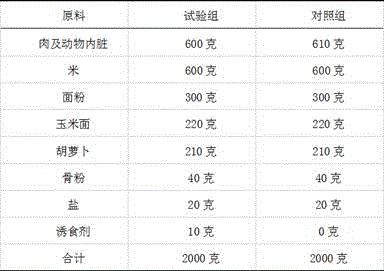Method for preparing nutrient phagostimulant by utilizing heparin wastewater
A food attractant and waste water technology, applied in chemical instruments and methods, animal processing waste water treatment, application, etc., can solve problems such as use restrictions, achieve the effects of improving fishy smell, low production cost, and purifying the environment
- Summary
- Abstract
- Description
- Claims
- Application Information
AI Technical Summary
Problems solved by technology
Method used
Image
Examples
Embodiment
[0022] The wastewater produced by the production of heparin sodium by enzymatic hydrolysis is 5000 liters. Add 10 kilograms of polyaluminum chloride and 50 ppm of 6 million molecular weight polyacrylamide and stir evenly. After 5 hours of precipitation, the precipitate accounts for 1 / 4 of the total liquid volume, namely: 1250 liters, the volume of the supernatant was 3750 liters. The supernatant is concentrated by nanofiltration membrane and nanofiltration. The molecular weight cut-off of the nanofiltration membrane is 100 Daltons. 3000 liters of water passing through the nanofiltration membrane are recycled for recycling, and the volume of the remaining concentrated liquid is 750 liters. Combine the primary sediment and the concentrated solution to obtain 2000 liters, adjust the pH=2 with sulfuric acid, and leave to settle for 4 hours. The upper clear liquid is 800 liters. After siphoning, it is nanofiltered again, and the remaining secondary sediment 1200 liters is added with ...
PUM
| Property | Measurement | Unit |
|---|---|---|
| molecular weight | aaaaa | aaaaa |
Abstract
Description
Claims
Application Information
 Login to View More
Login to View More - R&D
- Intellectual Property
- Life Sciences
- Materials
- Tech Scout
- Unparalleled Data Quality
- Higher Quality Content
- 60% Fewer Hallucinations
Browse by: Latest US Patents, China's latest patents, Technical Efficacy Thesaurus, Application Domain, Technology Topic, Popular Technical Reports.
© 2025 PatSnap. All rights reserved.Legal|Privacy policy|Modern Slavery Act Transparency Statement|Sitemap|About US| Contact US: help@patsnap.com

